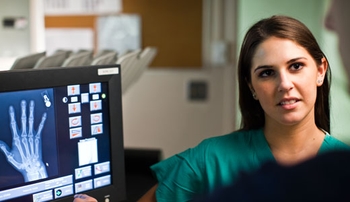A proposed new facility at UNMC’s Kearney division is the next step to address workforce shortages in nursing and the allied health professions.
University of Nebraska leaders have requested $19 million in state funds to build a health science education facility, which would increase teaching and research space, as well as educate more nurses for Nebraska.
 |
Allied Health and nursing educational offerings in central Nebraska would benefit from a proposed new health sciences education center on the University of Nebraska at Kearney campus. |
- Clinical laboratory science;
- Diagnostic medical sonography;
- Physician assistant; and
- Physical therapy and radiography.
The new building also will improve undergraduate health sciences education for University of Nebraska at Kearney students.
“The opportunity to expand our programs in the Kearney Division will help us educate more students in rural areas and focus especially on primary care and health needs in rural areas,” said Juliann Sebastian, Ph.D., dean of the UNMC College of Nursing.
New space needed
The existing space is inadequate for today’s curriculum and interactive, team-based learning, Dr. Sebastian said. University leaders propose a 30,000 square foot addition to UNK’s current science building, Bruner Hall of Science.
The proposal allows nursing, allied health and UNK students to have greater interprofessional educational opportunities with an innovative focus on rural primary care, and expose undergraduate students to careers in the health professions.
“Our experience has demonstrated that if students interested in rural practice are provided opportunities to obtain their education in rural communities, they have a greater likelihood of returning to those communities to practice after graduation,” said Kyle Meyer, Ph.D., senior associate dean of the School of Allied Health Professions.
Allows for more students
Under the proposal, Dr. Meyer said enrollment increases of 10 percent to 20 percent in the five programs, phased in over four years, would result in a total increase in enrollment at UNK of approximately 50 allied health professions students.
A new building would make it possible for the College of Nursing — over a three-year period — to expand total enrollment by 40 students.
The College of Nursing Kearney Division enrolls approximately 124 students each year and graduates 40. Last year, 48 percent of qualified applicants were turned away.